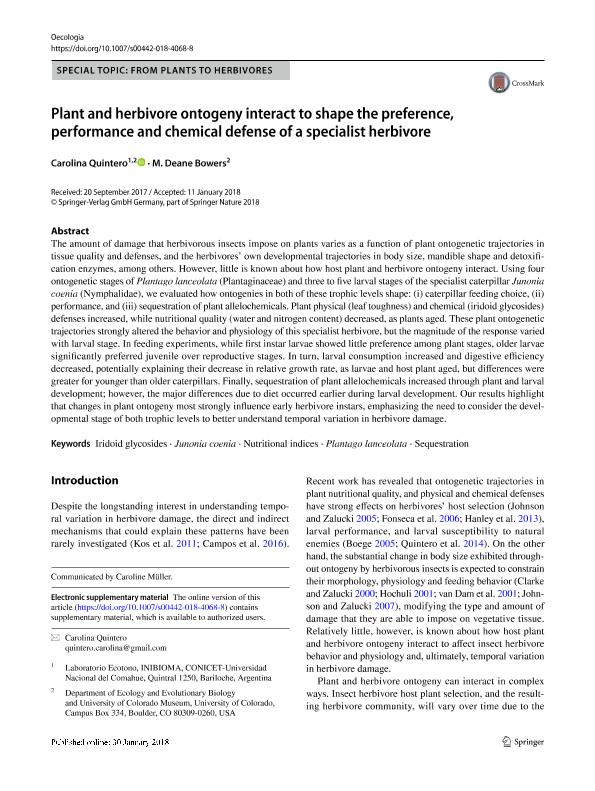Artículo
Plant and herbivore ontogeny interact to shape the preference, performance and chemical defense of a specialist herbivore
Fecha de publicación:
30/06/2018
Editorial:
Springer
Revista:
Oecologia
ISSN:
0029-8549
Idioma:
Inglés
Tipo de recurso:
Artículo publicado
Clasificación temática:
Resumen
The amount of damage that herbivorous insects impose on plants varies as a function of plant ontogenetic trajectories in tissue quality and defenses, and the herbivores’ own developmental trajectories in body size, mandible shape and detoxification enzymes, among others. However, little is known about how host plant and herbivore ontogeny interact. Using four ontogenetic stages of Plantago lanceolata (Plantaginaceae) and three to five larval stages of the specialist caterpillar Junonia coenia (Nymphalidae), we evaluated how ontogenies in both of these trophic levels shape: (i) caterpillar feeding choice, (ii) performance, and (iii) sequestration of plant allelochemicals. Plant physical (leaf toughness) and chemical (iridoid glycosides) defenses increased, while nutritional quality (water and nitrogen content) decreased, as plants aged. These plant ontogenetic trajectories strongly altered the behavior and physiology of this specialist herbivore, but the magnitude of the response varied with larval stage. In feeding experiments, while first instar larvae showed little preference among plant stages, older larvae significantly preferred juvenile over reproductive stages. In turn, larval consumption increased and digestive efficiency decreased, potentially explaining their decrease in relative growth rate, as larvae and host plant aged, but differences were greater for younger than older caterpillars. Finally, sequestration of plant allelochemicals increased through plant and larval development; however, the major differences due to diet occurred earlier during larval development. Our results highlight that changes in plant ontogeny most strongly influence early herbivore instars, emphasizing the need to consider the developmental stage of both trophic levels to better understand temporal variation in herbivore damage.
Archivos asociados
Licencia
Identificadores
Colecciones
Articulos(INIBIOMA)
Articulos de INST. DE INVEST.EN BIODIVERSIDAD Y MEDIOAMBIENTE
Articulos de INST. DE INVEST.EN BIODIVERSIDAD Y MEDIOAMBIENTE
Citación
Quintero, Carolina; Bowers, M. Deane; Plant and herbivore ontogeny interact to shape the preference, performance and chemical defense of a specialist herbivore; Springer; Oecologia; 187; 2; 30-6-2018; 401-412
Compartir
Altmétricas




